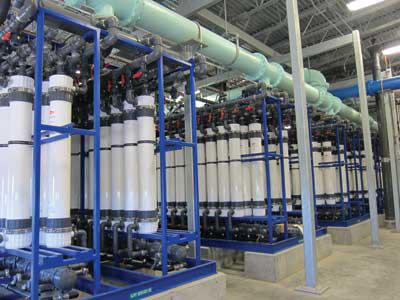Applications for UF Filtration Technology in Water & Wastewater

Water treatment technology is and can be applied to different municipalities, industries, and commercial businesses, each with their own specific water treatment needs. For this reason, it is beneficial to have technologies on hand that are versatile based on the treatment application. For instance, filters are used in almost every water/wastewater treatment application in either pretreatment or tertiary treatment applications. Like many of the other forms of filtration, uf filtration has its applications in the water and wastewater treatment industry.
In this article, we will review a few of the possible ways that UF filtration can be used by municipal and industrial companies to enhance water quality or reduce cost through water reuse.
Municipal
Drinking water
Treatment for drinking water requires a little bit of extra efficiency to ensure that the result is perfectly safe for consumption. Discharging wastewater into a stream has broader limits on certain chemicals and compounds for the most part, so more refined treatment processes may be unnecessary. UF filtration makes its use in this application as either a pretreatment for reverse osmosis, or as a tertiary filtration application.
Landfill leachate
Landfills are exposed to the elements, so after some time, rain washes all kinds of compounds to the bottom of the pile, forming a blackened yellow pool that can seep into the ground if the landfill liner leaks. The leachate has been the focus of a number of studies in how best to deal with it before it causes any harm. UF filtration can be used as one of the potential tertiary steps in the process to separate out the fine suspended solids, microbiological contaminants and color.
Tertiary treatment
For drinking water treatment or wastewater reuse applications, some level of tertiary treatment is needed in order to ensure the production of high-quality water. Aside from any leftover solids (suspended and high weight dissolved), ultrafiltration can also reduce bacteria and virus concentrations, which can decrease or eliminate post disinfection based on application.
Fixed film bioreactors
In applications with higher levels of organic solids like sewage treatment, some form of bioreactor is highly effective. In a fixed film system, a biofilm is encouraged to grow on a surface of some kind. Such a surface could even include a membrane such as one used in ultrafiltration. This offers the biological reactions to break down organic compounds provided by the biofilm with the separation ability of the membrane, making for a highly effective treatment method.
Industrial
Process water constitutes any water used directly in an industrial production process. Following the process, the expended water is contaminated with any number of compounds and chemicals depending on the industry. UF filtration can be a useful process for reducing or removing many of those possible contaminants in either a secondary or tertiary capacity.
RO pretreatment
Membrane filters need pretreatment measures in order to function to maximum performance for as long as possible. Pretreatment prevents membrane fouling and helps avoid excessive maintenance costs. In the case of reverse osmosis, uf filtration works very well as a pretreatment step to lessen the load on the RO membrane by separating the slightly larger particles and microbiological compounds from the source water.
Heavy metal removal
Heavy metals can contaminate the wastewater of a number of industrial facilities and if they are discharged into local water sources they can present very harmful effects on the environment. There are a few options to remove them, but some others require the introduction of chemicals into the wastewater. UF filtration can be one tool in a chemical-free treatment process for this particular application.
Textile wastewater
Textile facilities use large volumes of water for various cleaning and dyeing processes and so they also create similar volumes of wastewater. More wastewater usually means higher discharge costs, especially if not properly treated. Ultrafiltration as part of a tertiary treatment process can help potentially reduce those discharge costs.
In the effort of creating more sustainable and efficient production processes, companies looking for wastewater treatment systems want to reuse their wastewater if possible. In this way, it is possible to reduce discharge and water consumption costs. Some reuse applications may require higher quality water than others, but regardless, ultrafiltration as part of this wastewater reuse treatment process can potentially be beneficial.
Grey water reuse
Grey water is the water from showers, sinks, and other places that don’t contain human or animal sewage (a.k.a. black water). The process to treat grey water, particularly for reuse purposes is typically less complex than wastewater. Hotels and resorts can potentially make use of grey water treatment systems to help reduce operating costs. UF filtration can potentially act as a polishing filter at the end of the treatment process. that would give those buildings non-potable water for applications like irrigation and landscaping.
Pharmaceutical
There has been growing concern regarding the treatment of pharmaceutical wastewater. Conventional treatment systems are not capable of dealing with many of the complex organic compounds produced from these facilities. More advanced treatment options seem to be the way to proceed to reduce the presence of these compounds. Ultrafiltration is one such option, potentially as part of a tertiary treatment process in a decentralized treatment system located on-site.
Do you see your water treatment application on this list, and want to know more about how a UF filtration process can work for your organization? DON’T see your application, but think a ultrafiltration approach could work for your company? Give the water treatment experts at Genesis Water Technologies a call at 1-877-267-3699 or contact us by email at customersupport@genesiswatertech.com and we will help you figure out the right solution for your treatment challenges.
.

